一、前言:
- 这几个星期接触了电信计费的问题,这几次作业题量都相对来说不大,难度相对之前的点线形系列较低。
- 通过这几次的题目集重新巩固了正则表达式,以及继承与多态的运用。
- 第一次的题目集只要求写了座机计费,通过座机的区号判断所在位置,从而判断应该采用什么计费方式。
- 第二次的题目集增加了手机计费,不仅需要判断计费方式,还要判断拨打与接听的是手机还是座机。
- 第三次的题目集增加了短信计费,通过所在位置以及区号判断发短信价格。
- 三道题目,联系十分紧密,迭代关系,第一道题的源码第二题第三题都能够直接用上,再按照要求修改。
二、设计与分析:
7-1 电信计费系列1-座机计费
实现一个简单的电信计费程序:
假设南昌市电信分公司针对市内座机用户采用的计费方式:
月租20元,接电话免费,市内拨打电话0.1元/分钟,省内长途0.3元/分钟,国内长途拨打0.6元/分钟。不足一分钟按一分钟计。
南昌市的区号:0791,江西省内各地市区号包括:0790~0799以及0701。
输入格式:
输入信息包括两种类型
1、逐行输入南昌市用户开户的信息,每行一个用户,
格式:u-号码 计费类型 (计费类型包括:0-座机 1-手机实时计费 2-手机A套餐)
例如:u-079186300001 0
座机号码除区号外由是7-8位数字组成。
本题只考虑计费类型0-座机计费,电信系列2、3题会逐步增加计费类型。
2、逐行输入本月某些用户的通讯信息,通讯信息格式:
座机呼叫座机:t-主叫号码 接听号码 起始时间 结束时间
t-079186330022 058686330022 2022.1.3 10:00:25 2022.1.3 10:05:11
以上四项内容之间以一个英文空格分隔,
时间必须符合"yyyy.MM.dd HH:mm:ss"格式。提示:使用SimpleDateFormat类。
以上两类信息,先输入所有开户信息,再输入所有通讯信息,最后一行以“end”结束。
注意:
本题非法输入只做格式非法的判断,不做内容是否合理的判断(时间除外,否则无法计算),比如:
1、输入的所有通讯信息均认为是同一个月的通讯信息,不做日期是否在同一个月还是多个月的判定,直接将通讯费用累加,因此月租只计算一次。
2、记录中如果同一电话号码的多条通话记录时间出现重合,这种情况也不做判断,直接 计算每条记录的费用并累加。
3、用户区号不为南昌市的区号也作为正常用户处理。
输出格式:
根据输入的详细通讯信息,计算所有已开户的用户的当月费用(精确到小数点后2位,
单位元)。假设每个用户初始余额是100元。
每条通讯信息单独计费后累加,不是将所有时间累计后统一计费。
格式:号码+英文空格符+总的话费+英文空格符+余额
每个用户一行,用户之间按号码字符从小到大排序。
错误处理:
输入数据中出现的不符合格式要求的行一律忽略。
建议类图:
参见图1、2、3,可根据理解自行调整:
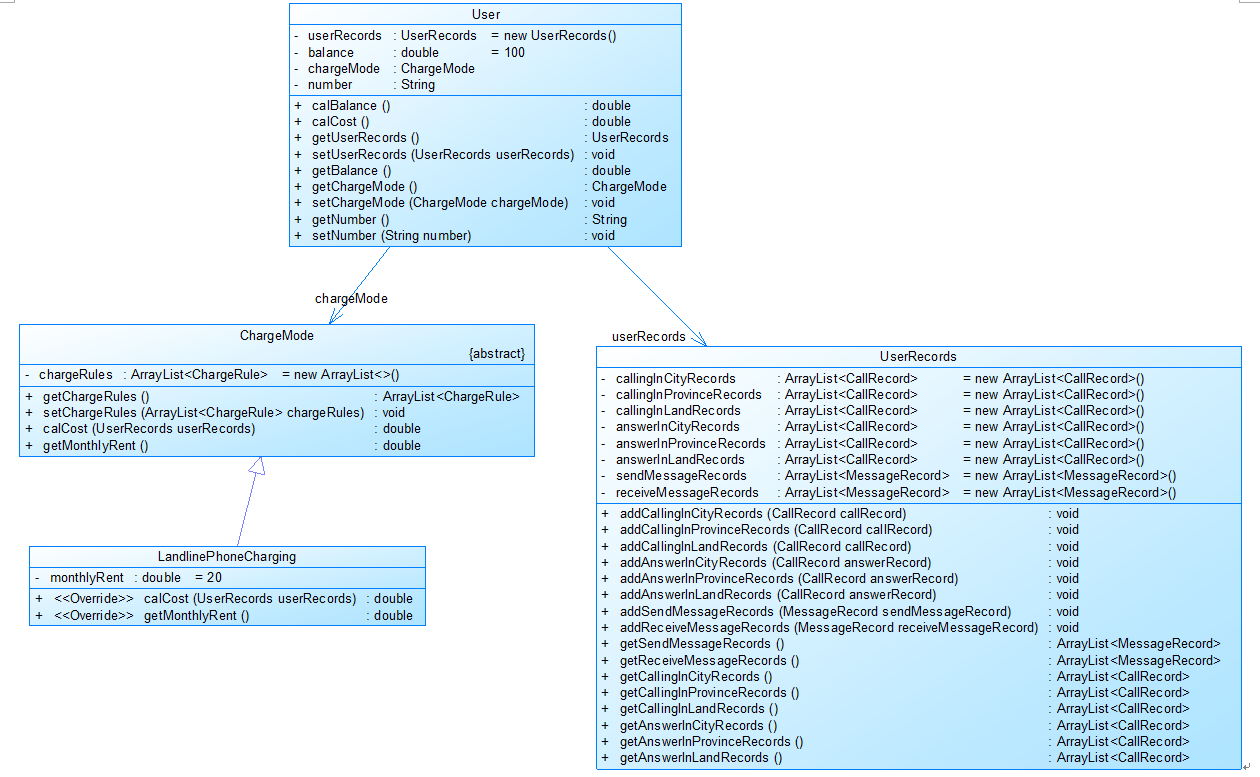
图1
图1中User是用户类,包括属性:
userRecords (用户记录)、balance(余额)、chargeMode(计费方式)、number(号码)。
ChargeMode是计费方式的抽象类:
chargeRules是计费方式所包含的各种计费规则的集合,ChargeRule类的定义见图3。
getMonthlyRent()方法用于返回月租(monthlyRent)。
UserRecords是用户记录类,保存用户各种通话、短信的记录,
各种计费规则将使用其中的部分或者全部记录。
其属性从上到下依次是:
市内拨打电话、省内(不含市内)拨打电话、省外拨打电话、
市内接听电话、省内(不含市内)接听电话、省外接听电话的记录
以及发送短信、接收短信的记录。
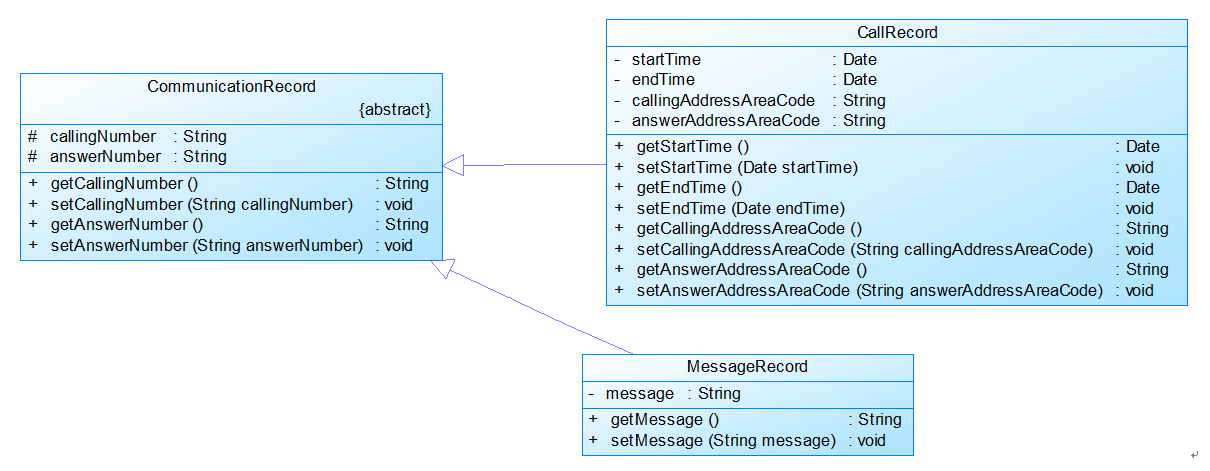
图2
图2中CommunicationRecord是抽象的通讯记录类:
包含callingNumber拨打号码、answerNumber接听号码两个属性。
CallRecord(通话记录)、MessageRecord(短信记录)是它的子类。
CallRecord(通话记录类)包含属性:
通话的起始、结束时间以及
拨号地点的区号(callingAddressAreaCode)、接听地点的区号(answerAddressAreaCode)。
区号用于记录在哪个地点拨打和接听的电话。座机无法移动,就是本机区号,如果是手机号,则会有差异。
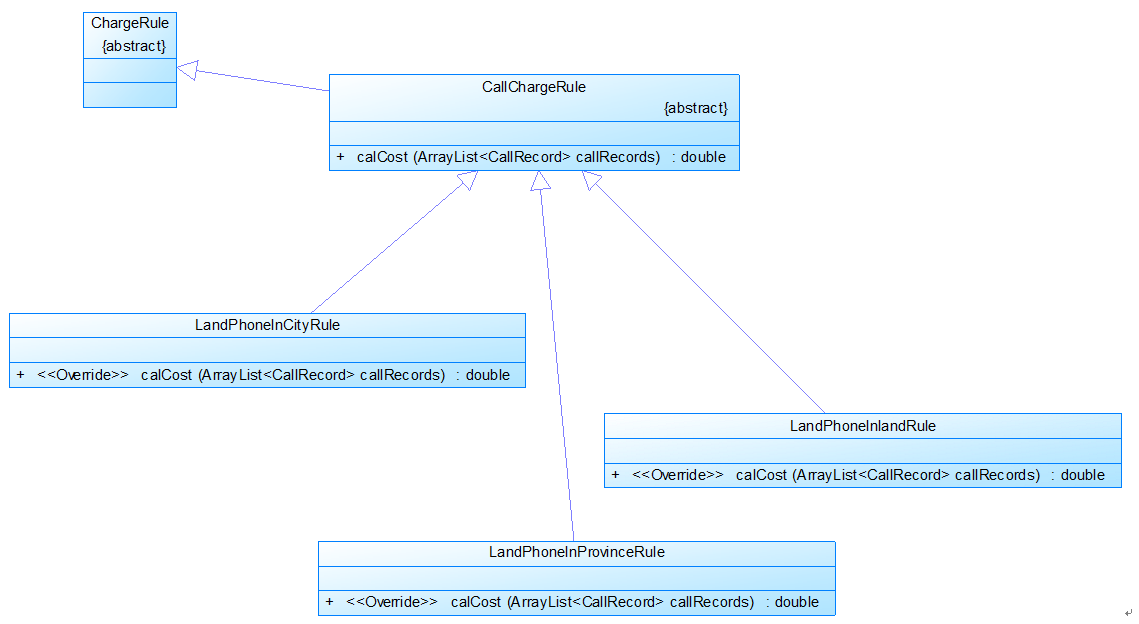
图3
图3是计费规则的相关类,这些类的核心方法是:
calCost(ArrayList<CallRecord> callRecords)。
该方法针根据输入参数callRecords中的所有记录计算某用户的某一项费用;如市话费。
输入参数callRecords的约束条件:必须是某一个用户的符合计费规则要求的所有记录。
LandPhoneInCityRule、LandPhoneInProvinceRule、LandPhoneInLandRule三个类分别是
座机拨打市内、省内、省外电话的计费规则类,用于实现这三种情况的费用计算。
(提示:可以从UserRecords类中获取各种类型的callRecords)。
后续扩展说明:
后续题目集将增加手机用户,手机用户的计费方式中除了与座机计费类似的主叫通话费之外,还包含市外接听电话的漫游费以及发短信的费用。在本题的设计时可统一考虑。
通话记录中,手机需要额外记录拨打/接听的地点的区号,比如:
座机打手机:t-主叫号码 接听号码 接听地点区号 起始时间 结束时间
t-079186330022 13305862264 020 2022.1.3 10:00:25 2022.1.3 10:05:11
手机互打:t-主叫号码 拨号地点 接听号码 接听地点区号 起始时间 结束时间
t-18907910010 0791 13305862264 0371 2022.1.3 10:00:25 2022.1.3 10:05:11
短信的格式:m-主叫号码,接收号码,短信内容
m-18907910010 13305862264 welcome to jiangxi
m-13305862264 18907910010 thank you
输入样例:
在这里给出一组输入。例如:
u-079186300001 0
t-079186300001 058686330022 2022.1.3 10:00:25 2022.1.3 10:05:25
end
输出样例:
在这里给出相应的输出。例如:
079186300001 3.0 77.0

import java.text.DecimalFormat;
import java.text.ParseException;
import java.text.SimpleDateFormat;
import java.util.*;
import java.util.Date;
import java.util.ArrayList;
public class Main {
public static void main(String[] args) throws ParseException {
Infor infor = new Infor();
infor.input();
}
}
class Infor{
public void input() throws ParseException {
Scanner in = new Scanner(System.in);
String[] x = new String[1000];
ArrayList<User> users = new ArrayList<>();//创建一个存储用户的数组
Map<String, User> mm = new HashMap<>();
int i = 0 , count = 0;
String [] str = new String[1000];
for(i = 0 ; i < 1000; i++) {
x[i] = in.nextLine();
String []a = x[i].split(" ");
if(numberBegin(x[i])){//注册账户正确
String []num = a[0].split("-");
User user = new User(num[1]);
for(int aa = 0 ;aa <= i ;aa++) {
if (x[i].equals(x[aa])&&i!=0 &&i!= aa)
break;
if (aa == i) {
users.add(user);//创建了一个用户
mm.put(num[1], user);
str[count] = num[1];
count++;
}
}
}
if(numberCallRecordBegin(a[0]) ){//通话记录格式正确
int j = 0,pos = 0;
String [] b = x[i].split(" ");
String [] c = b[0].split("-");//把第一个拆分了
if( numberEnd(b[1]) && isDate(b[2]) && isTime(b[3]) && isDate(b[4]) &&isTime(b[5])){//全部格式正确
for(j = 0; j < 1000;j++){
if(c[1].equals(str[j])) {
pos++;
break;
}
}
CallRecord callRecord = new CallRecord();
int result = 0;//开始地址
String endPlace = "";
result = getIsWhere(b[1]);
switch(result){
case 1: endPlace = "市内";break;
case 2: endPlace = "省内";break;
case 3: endPlace = "国内";break;
}
String startDate = b[2] + " " + b[3];
String endDate = b[4] + " " + b[5];
SimpleDateFormat simpleDateFormat = new SimpleDateFormat("yyyy.MM.dd HH:mm:ss");
Date date1 = simpleDateFormat.parse(startDate);
Date date2 = simpleDateFormat.parse(endDate);
callRecord.setStartTime(date1);
callRecord.setEndTime(date2);
callRecord.setCallingNumber(c[1]);
callRecord.setAnswerNumber(b[1]);
callRecord.setCallingAddressAreaCode("南昌");
callRecord.setAnswerAddressAreaCode(endPlace);
if(pos == 1)
switch (result){
case 1:users.get(j).getUserRecords().addCallingInCityRecords(callRecord);break;
case 2:users.get(j).getUserRecords().addCallingInProvinceRecords(callRecord);break;
case 3:users.get(j).getUserRecords().addCallingInLandRecords(callRecord);break;
}
}
}
if(x[i].equals("end"))
break;
}
for(User user : mm.values()){
System.out.println(user.getNumber() +" "+ user.calCost() +" "+ (80 - user.calCost()) );
}
}
public boolean numberBegin(String a){//注册的账号的内容
if(a.matches("^[u][-][0-9]{11}[0-9]{0,1}[ ][0]"))
return true;
else
return false;
}
public boolean numberCallRecordBegin(String a){//通话记录的格式是否正确
if(a.matches("^[t][-][0-9]{10,12}"))
return true;
else
return false;
}
public boolean numberEnd(String a){//判断是打电话的内容
if(a.matches("^[0-9]{10,12}"))
return true;
else
return false;
}
public boolean isDate(String str) {//判断日期的合法性
boolean result = true;
SimpleDateFormat format = new SimpleDateFormat("yyyy.MM.dd");
try {
format.setLenient(false);
format.parse(str);
}catch (Exception e){
result = false;
}
String [] a = str.split("[.]");
if(a[1].matches("^([1-9]|[1][0-2])") && a[2].matches("^([0][1-9]|[1-9]|[1-3][0-9])"))
result = true;
else
result = false;
return result;
}
public boolean isTime(String str){//判断时间是否合法
boolean result = true;
SimpleDateFormat format = new SimpleDateFormat("HH:mm:ss");
try {
format.setLenient(false);
format.parse(str);
}catch (Exception e){
result = false;
}
String []a = str.split("[:]");
if(a[0].matches("^([0][0-9]|[1][0-9]|[2][0-3])") && a[1].matches("^([0][0-9]|[1-5][0-9])")
&&a[2].matches("^([0][0-9]|[1-5][0-9])") )
result = true;
else
result = false;
return result;
}
public int getIsWhere(String str){
int result = 0;
if(str.matches("^[0][7][9][1][0-9]{7,8}"))//市内电话
result = 1;
else if(str.matches("(([0][7][9][0-9][0-9]{7,8}))"))//省内电话
result = 2;
else if(str.matches("[0][7][0][1][0-9]{7,8}"))//省内电话
result = 2;
else//国内电话
result = 3;
return result;
}
}
class User {
private UserRecords userRecords = new UserRecords();//用户记录
private double balance = 100;//余额
private ChargeMode chargeMode ;//计费方式
private String number = "";//号码
public User(String number) {
this.number = number;
this.chargeMode = new LandlinePhoneCharging();
}
public double calBalance(){//总计剩余余额
return (balance - calCost() - chargeMode.getMonthlyRent());
}
public double calCost(){//总计消费余额,这里面没有信息消费
double cost = chargeMode.calCost(userRecords);
return cost;
}
public UserRecords getUserRecords() {
return userRecords;
}
public void setUserRecords(UserRecords userRecords) {
this.userRecords = userRecords;
}
public double getBalance() {
return balance;
}
public void setBalance(double balance) {
this.balance = balance;
}
public ChargeMode getChargeMode() {
return chargeMode;
}
public void setChargeMode(ChargeMode chargeMode) {
this.chargeMode = chargeMode;
}
public String getNumber() {
return number;
}
public void setNumber(String number) {
this.number = number;
}
}
class UserRecords {
private ArrayList<CallRecord> callingInCityRecords = new ArrayList<>();
private ArrayList<CallRecord> callingInProvinceRecords = new ArrayList<>();
private ArrayList<CallRecord> callingInLandRecords = new ArrayList<>();
private ArrayList<CallRecord> answerInCityRecords = new ArrayList<>();
private ArrayList<CallRecord> answerInProvinceRecords = new ArrayList<>();
private ArrayList<CallRecord> answerInLandRecords = new ArrayList<>();
private ArrayList<MessageRecord> sendMessageRecords = new ArrayList<>();
private ArrayList<MessageRecord> receiveMessageRecords = new ArrayList<>();
public UserRecords() {
}
public void addCallingInCityRecords(CallRecord callRecord){
callingInCityRecords.add(callRecord);
}
public void addCallingInProvinceRecords(CallRecord callRecord){
callingInProvinceRecords.add(callRecord);
}
public void addCallingInLandRecords (CallRecord callRecord){
callingInLandRecords.add(callRecord);
}
public void addAnswerInCityRecords(CallRecord callRecord){
answerInCityRecords.add(callRecord);
}
public void addAnswerInProvinceRecords(CallRecord callRecord){
answerInLandRecords.add(callRecord);
}
public void answerInLandRecords (CallRecord callRecord){
answerInLandRecords.add(callRecord);
}
public void addSendMessageRecords(MessageRecord messageRecord){
sendMessageRecords.add(messageRecord);
}
public void addReceiveMessageRecords(MessageRecord messageRecord){
receiveMessageRecords.add(messageRecord);
}
public ArrayList<CallRecord> getCallingInCityRecords() {
return callingInCityRecords;
}
public ArrayList<CallRecord> getCallingInProvinceRecords() {
return callingInProvinceRecords;
}
public ArrayList<CallRecord> getCallingInLandRecords() {
return callingInLandRecords;
}
public ArrayList<CallRecord> getAnswerInCityRecords() {
return answerInCityRecords;
}
public ArrayList<CallRecord> getAnswerInProvinceRecords() {
return answerInProvinceRecords;
}
public ArrayList<CallRecord> getAnswerInLandRecords() {
return answerInLandRecords;
}
public ArrayList<MessageRecord> getSendMessageRecords() {
return sendMessageRecords;
}
public ArrayList<MessageRecord> getReceiveMessageRecords() {
return receiveMessageRecords;
}
}
abstract class CommunicationRecord{
protected String callingNumber;
protected String answerNumber;
public CommunicationRecord(){
}
public String getCallingNumber() {
return callingNumber;
}
public void setCallingNumber(String callingNumber) {
this.callingNumber = callingNumber;
}
public String getAnswerNumber() {
return answerNumber;
}
public void setAnswerNumber(String answerNumber) {
this.answerNumber = answerNumber;
}
}
class CallRecord extends CommunicationRecord{
private Date startTime;
private Date endTime;
private String callingAddressAreaCode;
private String answerAddressAreaCode;
public CallRecord(){
}
public Date getStartTime() {
return startTime;
}
public void setStartTime(Date startTime) {
this.startTime = startTime;
}
public Date getEndTime() {
return endTime;
}
public void setEndTime(Date endTime) {
this.endTime = endTime;
}
public String getCallingAddressAreaCode() {
return callingAddressAreaCode;
}
public void setCallingAddressAreaCode(String callingAddressAreaCode) {
this.callingAddressAreaCode = callingAddressAreaCode;
}
public String getAnswerAddressAreaCode() {
return answerAddressAreaCode;
}
public void setAnswerAddressAreaCode(String answerAddressAreaCode) {
this.answerAddressAreaCode = answerAddressAreaCode;
}
//还有继承的方法没有实现
}
class MessageRecord extends CommunicationRecord{
private String message;
public MessageRecord(){
}
public String getMessage() {
return message;
}
public void setMessage(String message) {
this.message = message;
}
//还有继承的方法没有实现
}
abstract class ChargeMode {
private ArrayList<ChargeRule> chargeRules = new ArrayList<>();
private LandPhoneInProvinceRule landPhoneInProvinceRule = new LandPhoneInProvinceRule();
private LandPhoneInLandRule landPhoneInLandRule = new LandPhoneInLandRule();
private LandPhoneInCityRule landPhoneInCityRule = new LandPhoneInCityRule();
public ChargeMode(){
chargeRules.add(landPhoneInCityRule);
chargeRules.add(landPhoneInProvinceRule);
chargeRules.add(landPhoneInLandRule);
}
public ArrayList<ChargeRule> getChargeRules() {
return chargeRules;
}
public void setChargeRules(ArrayList<ChargeRule> chargeRules) {
this.chargeRules = chargeRules;
}
public abstract double calCost(UserRecords userRecords);
public abstract double getMonthlyRent();
}
class LandlinePhoneCharging extends ChargeMode{
private double monthlyRent = 20;
public LandlinePhoneCharging(){
}
@Override
public double calCost(UserRecords userRecords) {
//数据中有起始时间和终止时间
//打电话的地址和接电话的地址
//需要转换成数字
//需要
double cost1 = getChargeRules().get(0).calCost(userRecords.getCallingInCityRecords());
double cost2 = getChargeRules().get(1).calCost(userRecords.getCallingInProvinceRecords());
double cost3 = getChargeRules().get(2).calCost(userRecords.getCallingInLandRecords());
return cost1 + cost2 + cost3;
}
@Override
public double getMonthlyRent() {
return monthlyRent;
}
}
abstract class ChargeRule {
public abstract double calCost(ArrayList<CallRecord> callRecord);
}
abstract class CallChargeRule extends ChargeRule{
public abstract double calCost(ArrayList<CallRecord> callRecord);
}
class LandPhoneInLandRule extends CallChargeRule{
@Override
public double calCost(ArrayList<CallRecord> callRecord) {//这是一个数组
double second = 0,cost = 0,second1;
for (int i = 0;i < callRecord.size() ;i++){
second = -(callRecord.get(i).getStartTime().getTime()-callRecord.get(i).getEndTime().getTime())/1000/60.0;
DecimalFormat df = new DecimalFormat("0");
second1 = Double.parseDouble(df.format(second));
if(second > second1)
second = second1 + 1;
else
second = second1;
cost = cost + second * 0.6;
DecimalFormat df1 = new DecimalFormat("0.0");
cost = Double.parseDouble(df1.format(cost));
}
return cost;
}
}
class LandPhoneInProvinceRule extends CallChargeRule{
@Override
public double calCost(ArrayList<CallRecord> callRecord) {
double second = 0,cost = 0,second1 = 0;
for (int i = 0;i < callRecord.size() ;i++){
second = -(callRecord.get(i).getStartTime().getTime()-callRecord.get(i).getEndTime().getTime())/1000/60.0;
DecimalFormat df = new DecimalFormat("0");
second1 = Double.parseDouble(df.format(second));
if(second > second1)
second = second1 + 1;
else
second = second1;
cost = cost + second * 0.3;
DecimalFormat df1 = new DecimalFormat("0.0");
cost = Double.parseDouble(df1.format(cost));
}
return cost;
}
}
class LandPhoneInCityRule extends CallChargeRule{
@Override
public double calCost(ArrayList<CallRecord> callRecord) {
double second = 0,cost = 0,second1 = 0;
for (int i = 0;i < callRecord.size() ;i++){
second = -(callRecord.get(i).getStartTime().getTime()-callRecord.get(i).getEndTime().getTime())/1000/60.0;
DecimalFormat df = new DecimalFormat("0");
second1 = Double.parseDouble(df.format(second));
if(second > second1)
second = second1 ;
else
second = second1;
cost = cost + second * 0.1;
DecimalFormat df1 = new DecimalFormat("0.0");
cost = Double.parseDouble(df1.format(cost));
}
return cost;
}
}
View Code
SourceMonitor报表如下:

7-1 电信计费系列2-手机+座机计费
实现南昌市电信分公司的计费程序,假设该公司针对手机和座机用户分别采取了两种计费方案,分别如下:
1、针对市内座机用户采用的计费方式(与电信计费系列1内容相同):
月租20元,接电话免费,市内拨打电话0.1元/分钟,省内长途0.3元/分钟,国内长途拨打0.6元/分钟。不足一分钟按一分钟计。
假设本市的区号:0791,江西省内各地市区号包括:0790~0799以及0701。
2、针对手机用户采用实时计费方式:
月租15元,市内省内接电话均免费,市内拨打市内电话0.1元/分钟,市内拨打省内电话0.2元/分钟,市内拨打省外电话0.3元/分钟,省内漫游打电话0.3元/分钟,省外漫游接听0.3元/分钟,省外漫游拨打0.6元/分钟;
注:被叫电话属于市内、省内还是国内由被叫电话的接听地点区号决定,比如以下案例中,南昌市手机用户13307912264在区号为020的广州接听了电话,主叫号码应被计算为拨打了一个省外长途,同时,手机用户13307912264也要被计算省外接听漫游费:
u-13307912264 1
t-079186330022 13307912264 020 2022.1.3 10:00:25 2022.1.3 10:05:11
输入:
输入信息包括两种类型
1、逐行输入南昌市用户开户的信息,每行一个用户,含手机和座机用户
格式:u-号码 计费类型 (计费类型包括:0-座机 1-手机实时计费 2-手机A套餐)
例如:u-079186300001 0
座机号码由区号和电话号码拼接而成,电话号码包含7-8位数字,区号最高位是0。
手机号码由11位数字构成,最高位是1。
本题在电信计费系列1基础上增加类型1-手机实时计费。
手机设置0或者座机设置成1,此种错误可不做判断。
2、逐行输入本月某些用户的通讯信息,通讯信息格式:
座机呼叫座机:t-主叫号码 接听号码 起始时间 结束时间
t-079186330022 058686330022 2022.1.3 10:00:25 2022.1.3 10:05:11
以上四项内容之间以一个英文空格分隔,
时间必须符合"yyyy.MM.dd HH:mm:ss"格式。提示:使用SimpleDateFormat类。
输入格式增加手机接打电话以及收发短信的格式,手机接打电话的信息除了号码之外需要额外记录拨打/接听的地点的区号,比如:
座机打手机:
t-主叫号码 接听号码 接听地点区号 起始时间 结束时间
t-079186330022 13305862264 020 2022.1.3 10:00:25 2022.1.3 10:05:11
手机互打:
t-主叫号码 拨号地点 接听号码 接听地点区号 起始时间 结束时间
t-18907910010 0791 13305862264 0371 2022.1.3 10:00:25 2022.1.3 10:05:11
注意:以上两类信息,先输入所有开户信息,再输入所有通讯信息,最后一行以“end”结束。
输出:
根据输入的详细通讯信息,计算所有已开户的用户的当月费用(精确到小数点后2位,单位元)。假设每个用户初始余额是100元。
每条通讯、短信信息均单独计费后累加,不是将所有信息累计后统一计费。
格式:号码+英文空格符+总的话费+英文空格符+余额
每个用户一行,用户之间按号码字符从小到大排序。
错误处理:
输入数据中出现的不符合格式要求的行一律忽略。
本题只做格式的错误判断,无需做内容上不合理的判断,比如同一个电话两条通讯记录的时间有重合、开户号码非南昌市的号码等,此类情况都当成正确的输入计算。但时间的输入必须符合要求,比如不能输入2022.13.61 28:72:65。
建议类图:
参见图1、2、3:
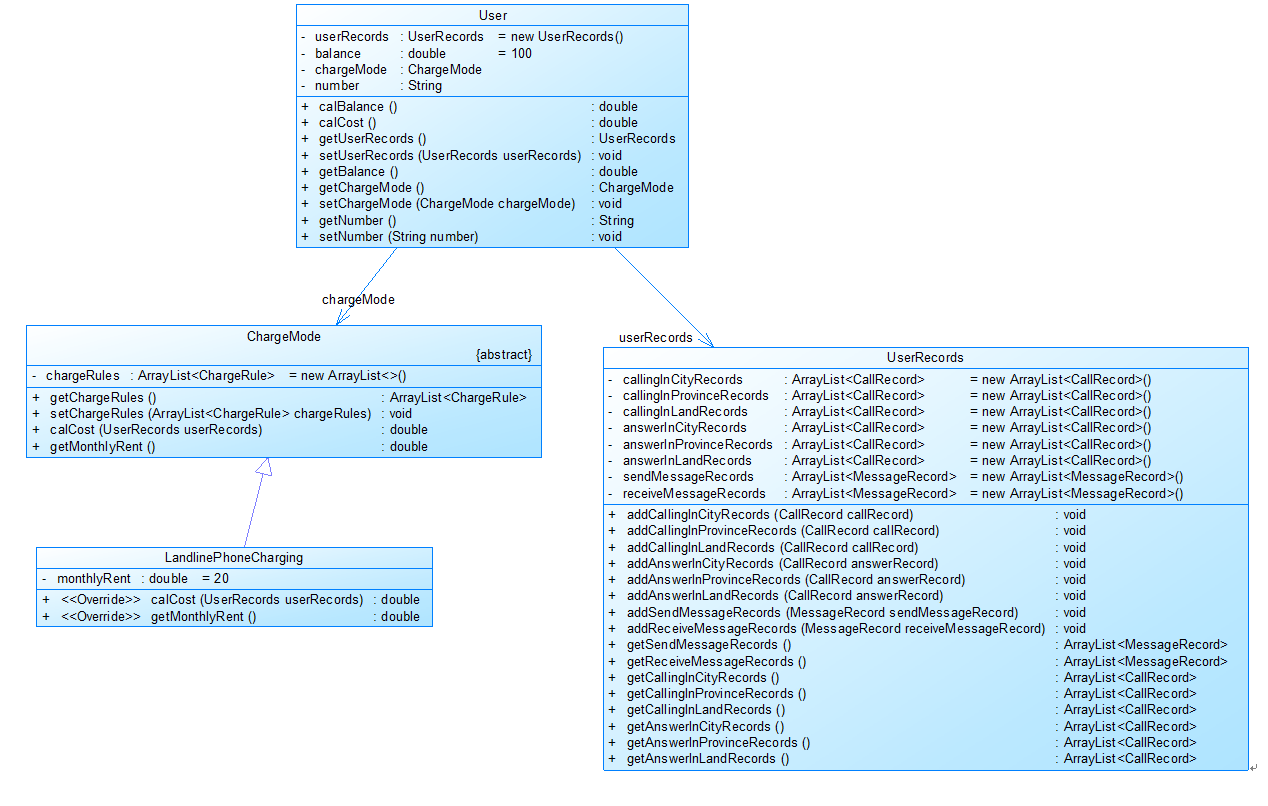
图1
图1中User是用户类,包括属性:
userRecords (用户记录)、balance(余额)、chargeMode(计费方式)、number(号码)。
ChargeMode是计费方式的抽象类:
chargeRules是计费方式所包含的各种计费规则的集合,ChargeRule类的定义见图3。
getMonthlyRent()方法用于返回月租(monthlyRent)。
UserRecords是用户记录类,保存用户各种通话、短信的记录,
各种计费规则将使用其中的部分或者全部记录。
其属性从上到下依次是:
市内拨打电话、省内(不含市内)拨打电话、省外拨打电话、
市内接听电话、省内(不含市内)接听电话、省外接听电话的记录
以及发送短信、接收短信的记录。
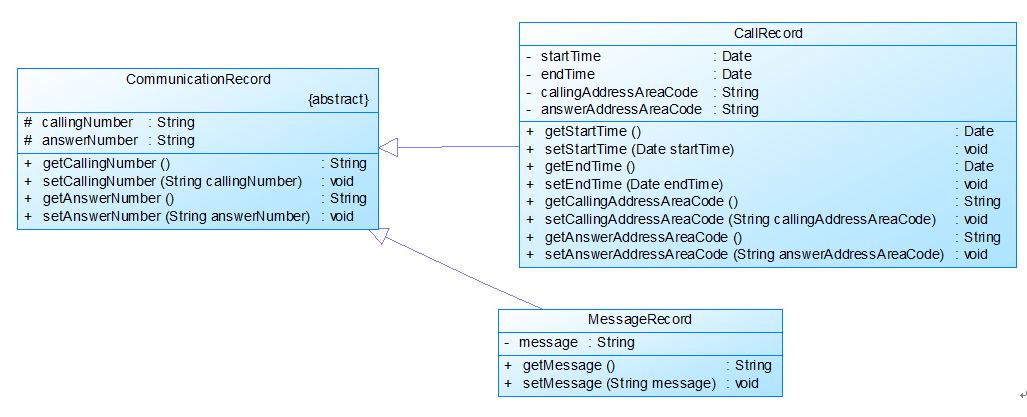
图2
图2中CommunicationRecord是抽象的通讯记录类:
包含callingNumber拨打号码、answerNumber接听号码两个属性。
CallRecord(通话记录)、MessageRecord(短信记录)是它的子类。CallRecord(通话记录类)包含属性:
通话的起始、结束时间以及
拨号地点的区号(callingAddressAreaCode)、接听地点的区号(answerAddressAreaCode)。
区号用于记录在哪个地点拨打和接听的电话。座机无法移动,就是本机区号,如果是手机号,则会有差异。
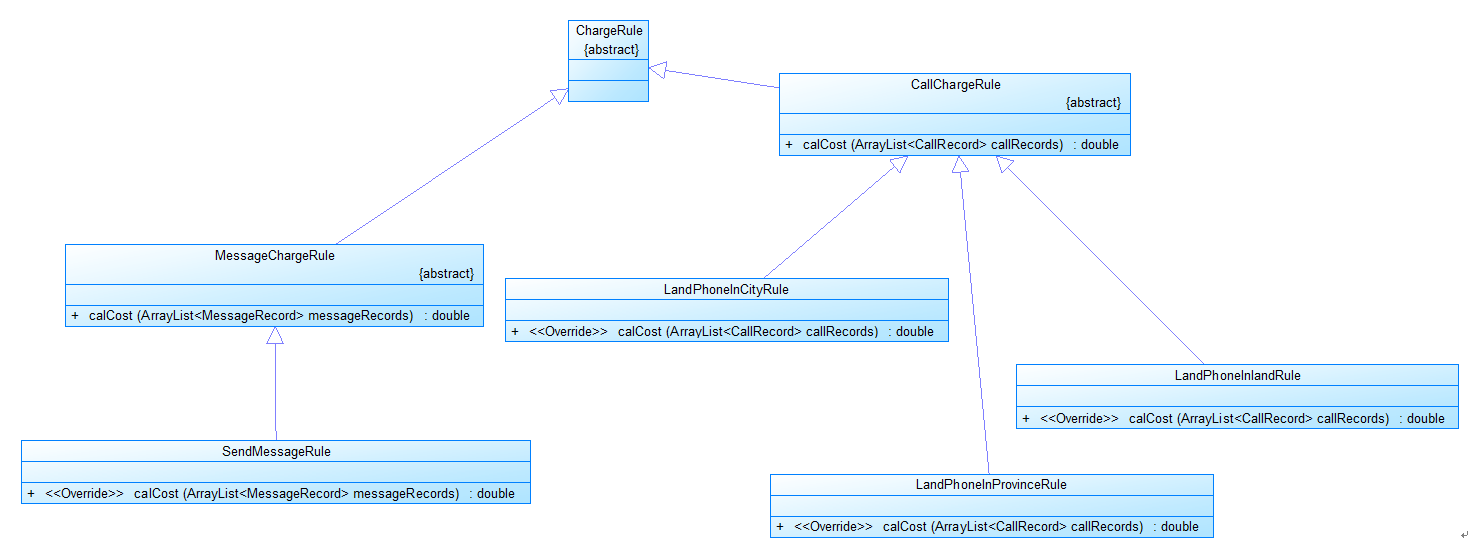
图3
图3是计费规则的相关类,这些类的核心方法是:
calCost(ArrayList<CallRecord> callRecords)。
该方法针根据输入参数callRecords中的所有记录计算某用户的某一项费用;如市话费。
输入参数callRecords的约束条件:必须是某一个用户的符合计费规则要求的所有记录。
SendMessageRule是发送短信的计费规则类,用于计算发送短信的费用。
LandPhoneInCityRule、LandPhoneInProvinceRule、LandPhoneInLandRule三个类分别是座机拨打市内、省内、省外电话的计费规则类,用于实现这三种情况的费用计算。
(提示:可以从UserRecords类中获取各种类型的callRecords)。
注意:以上图中所定义的类不是限定要求,根据实际需要自行补充或修改。
输入样例:
在这里给出一组输入。例如:
u-13811111111 1
t-13811111111 0791 13811111110 020 2022.1.3 08:00:00 2022.1.3 08:09:20
end
输出样例:
在这里给出相应的输出。例如:
13811111111 3.0 82.0
源代码:

import java.text.ParseException;
import java.text.SimpleDateFormat;
import java.util.ArrayList;
import java.util.Date;
import java.util.Scanner;
import java.util.regex.Matcher;
import java.util.regex.Pattern;
public class Main {
public static void main(String[] args) throws ParseException {
LandPhonelnlandRule landPhonelnlandRule = new LandPhonelnlandRule();
LandPhoneInCityRule landPhoneInCityRule = new LandPhoneInCityRule();
LandPhoneInProvinceRule landPhoneInProvinceRule = new LandPhoneInProvinceRule();
LandlinePhoneCharging landlinePhoneCharging = new LandlinePhoneCharging();
landlinePhoneCharging.getChargeRules().add(landPhoneInCityRule);
landlinePhoneCharging.getChargeRules().add(landPhoneInProvinceRule);
landlinePhoneCharging.getChargeRules().add(landPhonelnlandRule);
MobilePhoneInCityRule mobilePhoneInCityRule = new MobilePhoneInCityRule();
MobilePhoneInProvinceRule mobilePhoneInProvinceRule = new MobilePhoneInProvinceRule();
MobilePhoneInLandRule mobilePhoneInLandRule = new MobilePhoneInLandRule();
MobilePhoneCallOutCityRule mobilePhoneCallOutCityRule = new MobilePhoneCallOutCityRule();
MobilePhoneCallOutProvince mobilePhoneCallOutProvince = new MobilePhoneCallOutProvince();
MobilePhoneAnswerOutProvince mobilePhoneAnswerOutProvince = new MobilePhoneAnswerOutProvince();
MobilePhoneCharging mobilePhoneCharging = new MobilePhoneCharging();
mobilePhoneCharging.getChargeRules1().add(mobilePhoneInCityRule);
mobilePhoneCharging.getChargeRules1().add(mobilePhoneInProvinceRule);
mobilePhoneCharging.getChargeRules1().add(mobilePhoneInLandRule);
mobilePhoneCharging.getChargeRules1().add(mobilePhoneCallOutCityRule);
mobilePhoneCharging.getChargeRules1().add(mobilePhoneCallOutProvince);
mobilePhoneCharging.getChargeRules1().add(mobilePhoneAnswerOutProvince);
ArrayList<User> UserList = new ArrayList<>();
ArrayList<User> User1List = new ArrayList<>();
Scanner in = new Scanner(System.in);
String m = in.nextLine();
int flag;
while (!m.equals("end")) {
Judge judge = new Judge();
if (judge.isUserInformation(m)) {
String regex = "(0791)[\\d]{7,8}";
Pattern pattern = Pattern.compile(regex);
Matcher matcher = pattern.matcher(m);
while (matcher.find()) {
flag = 0;
for (User user : UserList
) {
if (user.getNumber().equals(matcher.group(0))) {
flag = 1;
break;
}
}
if (flag == 0) {
UserList.add(new User(matcher.group(0)));
}
}
}
if (judge.isUser1Information(m)) {
String regex = "[\\d][\\d]{10}";
Pattern pattern = Pattern.compile(regex);
Matcher matcher = pattern.matcher(m);
while (matcher.find()) {
flag = 0;
for (User user : User1List
) {
if (user.getNumber().equals(matcher.group(0))) {
flag = 1;
break;
}
}
if (flag == 0) {
User1List.add(new User(matcher.group(0)));
}
}
}
if (judge.isCallingInformation(m)) {
String[] a = m.split(" ");
try {
SimpleDateFormat format = new SimpleDateFormat("yyyy.MM.dd HH:mm:ss");
Date startTime = format.parse(a[2] + " " + a[3]);
Date endTime = format.parse(a[4] + " " + a[5]);
for (User user : UserList
) {
if (user.getNumber().equals(a[0].substring(2))) {
if (judge.isInCityCode(a[1].substring(0, 4))) {
user.getUserRecords().addCallingInCityRecords(new CallRecord(startTime, endTime, a[0].substring(2, 6), a[1].substring(0, 4)));
} else if (judge.isInProvinceCode(a[1].substring(0, 4))) {
user.getUserRecords().addCallingInProvinceRecords(new CallRecord(startTime, endTime, a[0].substring(2, 6), a[1].substring(0, 4)));
} else {
user.getUserRecords().addCallingInLandRecords(new CallRecord(startTime, endTime, a[0].substring(2, 6), a[1].substring(0, 4)));
}
}
}
} catch (ParseException e) {
e.printStackTrace();
}
}
if (judge.isCalling01Information(m)) {
String[] a = m.split(" ");
try {
SimpleDateFormat format = new SimpleDateFormat("yyyy.MM.dd HH:mm:ss");
Date startTime = format.parse(a[3] + " " + a[4]);
Date endTime = format.parse(a[5] + " " + a[6]);
for (User user : UserList
) {
if (user.getNumber().equals(a[0].substring(2))) {
if (judge.isInCityCode(a[2])) {
user.getUserRecords().addCallingInCityRecords(new CallRecord(startTime, endTime, a[0].substring(2, 6), a[2]));
} else if (judge.isInProvinceCode(a[2])) {
user.getUserRecords().addCallingInProvinceRecords(new CallRecord(startTime, endTime, a[0].substring(2, 6), a[2]));
} else {
user.getUserRecords().addCallingInLandRecords(new CallRecord(startTime, endTime, a[0].substring(2, 6), a[2]));
}
}
}
for (User user : User1List
) {
if (user.getNumber().equals(a[1])) {
if (judge.isAnswerInCityCode1(a[2])) {
;
} else if (judge.isAnswerInProvinceCode1(a[2])) {
;
} else {
user.getUserRecords().addAnswerInLandRecords(new CallRecord(startTime, endTime, a[0].substring(2, 6), a[2]));
}
}
}
} catch (ParseException e) {
e.printStackTrace();
}
}
if (judge.isCalling11Information(m)) {
String[] a = m.split(" ");
try {
SimpleDateFormat format = new SimpleDateFormat("yyyy.MM.dd HH:mm:ss");
Date startTime = format.parse(a[4] + " " + a[5]);
Date endTime = format.parse(a[6] + " " + a[7]);
for (User user : User1List
) {
if (user.getNumber().equals(a[0].substring(2))) {
if (judge.isCallInCity(a[1])) {
if (judge.isInCityCode(a[3])) {
user.getUserRecords().addCallingInCityRecords(new CallRecord(startTime, endTime, a[1], a[3]));
} else if (judge.isInProvinceCode(a[3])) {
user.getUserRecords().addCallingInProvinceRecords(new CallRecord(startTime, endTime, a[1], a[3]));
} else {
user.getUserRecords().addCallingInLandRecords(new CallRecord(startTime, endTime, a[1], a[3]));
}
} else if (judge.isInProvinceCode(a[1])) {
user.getUserRecords().addManYouInProvinceRecords(new CallRecord(startTime, endTime, a[1], a[3]));
} else {
user.getUserRecords().addManYouOutProvinceRecords(new CallRecord(startTime, endTime, a[1], a[3]));
}
}
}
for (User user : User1List
) {
if (user.getNumber().equals(a[2])) {
if (judge.isAnswerInCityCode1(a[3])) {
;
} else if (judge.isAnswerInProvinceCode1(a[3])) {
;
} else {
user.getUserRecords().addAnswerInLandRecords(new CallRecord(startTime, endTime, a[0].substring(2, 6), a[2]));
}
}
}
} catch (ParseException e) {
e.printStackTrace();
}
}
if (judge.isCalling10Information(m)) {
String[] a = m.split(" ");
try {
SimpleDateFormat format = new SimpleDateFormat("yyyy.MM.dd HH:mm:ss");
Date startTime = format.parse(a[3] + " " + a[4]);
Date endTime = format.parse(a[5] + " " + a[6]);
for (User user : User1List
) {
if (user.getNumber().equals(a[0].substring(2))) {
if (judge.isCallInCity(a[1])) {
if (judge.isInCityCode(a[2].substring(0,4))) {
user.getUserRecords().addCallingInCityRecords(new CallRecord(startTime, endTime, a[1], a[3]));
} else if (judge.isInProvinceCode(a[2].substring(0,4))) {
user.getUserRecords().addCallingInProvinceRecords(new CallRecord(startTime, endTime, a[1], a[3]));
} else {
user.getUserRecords().addCallingInLandRecords(new CallRecord(startTime, endTime, a[1], a[3]));
}
} else if (judge.isInProvinceCode(a[1])) {
user.getUserRecords().addManYouInProvinceRecords(new CallRecord(startTime, endTime, a[1], a[3]));
} else {
user.getUserRecords().addManYouOutProvinceRecords(new CallRecord(startTime, endTime, a[1], a[3]));
}
}
}
} catch (ParseException e) {
e.printStackTrace();
}
}
m = in.nextLine();
}
for (User user : UserList
) {
user.setChargeMode(landlinePhoneCharging);
}
for (User user:User1List
) {
user.setChargeMode(mobilePhoneCharging);
}
for (int i = 0; i < UserList.size(); i++) {
int index = -1;
Double min = Double.parseDouble(UserList.get(i).getNumber());
for (int j = i + 1; j < UserList.size(); j++) {
if (Double.parseDouble(UserList.get(j).getNumber()) < min) {
min = Double.parseDouble(UserList.get(j).getNumber());
index = j;
}
}
if (min != Double.parseDouble(UserList.get(i).getNumber())) {
User user = UserList.get(i);
UserList.set(i, UserList.get(index));
UserList.set(index, user);
}
}
for (int i = 0; i < User1List.size(); i++) {
int index = -1;
Double min = Double.parseDouble(User1List.get(i).getNumber());
for (int j = i + 1; j < User1List.size(); j++) {
if (Double.parseDouble(User1List.get(j).getNumber()) < min) {
min = Double.parseDouble(User1List.get(j).getNumber());
index = j;
}
}
if (min != Double.parseDouble(User1List.get(i).getNumber())) {
User user = User1List.get(i);
User1List.set(i, User1List.get(index));
User1List.set(index, user);
}
}
for (User user : UserList
) {
System.out.printf("%s %.1f %.1f\n", user.getNumber(), user.getChargeMode().calCost(user.getUserRecords()), user.getBalance());
}
for (User user : User1List
) {
System.out.printf("%s %.1f %.1f\n", user.getNumber(), user.getChargeMode().calCost(user.getUserRecords()), user.getBalance());
}
}
}
abstract class CallChargeRule extends ChargeRule{
public double calCost(ArrayList<CallRecord> callRecords){
return 0;
}
}
class CallRecord extends CommunicationRecord{
private Date startTime;
private Date endTime;
private String callingAddressAreaCode;
private String answerAddressAreaCode;
public CallRecord(Date startTime, Date endTime, String callingAddressAreaCode, String answerAddressAreaCode) {
this.startTime = startTime;
this.endTime = endTime;
this.callingAddressAreaCode = callingAddressAreaCode;
this.answerAddressAreaCode = answerAddressAreaCode;
}
public Date getStartTime() {
return startTime;
}
public void setStartTime(Date startTime) {
this.startTime = startTime;
}
public Date getEndTime() {
return endTime;
}
public void setEndTime(Date endTime) {
this.endTime = endTime;
}
public String getCallingAddressAreaCode() {
return callingAddressAreaCode;
}
public void setCallingAddressAreaCode(String callingAddressAreaCode) {
this.callingAddressAreaCode = callingAddressAreaCode;
}
public String getAnswerAddressAreaCode() {
return answerAddressAreaCode;
}
public void setAnswerAddressAreaCode(String answerAddressAreaCode) {
this.answerAddressAreaCode = answerAddressAreaCode;
}
}
abstract class ChargeMode {
private ArrayList<ChargeRule> chargeRules = new ArrayList<>();
private ArrayList<ChargeRule> chargeRules1 = new ArrayList<>();
public ArrayList<ChargeRule> getChargeRules1() {
return chargeRules1;
}
public ArrayList<ChargeRule> getChargeRules() {
return chargeRules;
}
public void setChargeRules(ArrayList<ChargeRule> chargeRules) {
this.chargeRules = chargeRules;
}
public double calCost(UserRecords userRecords){
return 0;
}
public double getMonthlyRent(){
return 0;
}
}
abstract class ChargeRule {
public double calCost(ArrayList<CallRecord> callRecords){
return 0;
}
}
abstract class CommunicationRecord {
protected String callingNumber;
protected String answerNumber;
public String getCallingNumber() {
return callingNumber;
}
public void setCallingNumber(String callingNumber) {
this.callingNumber = callingNumber;
}
public String getAnswerNumber() {
return answerNumber;
}
public void setAnswerNumber(String answerNumber) {
this.answerNumber = answerNumber;
}
}
class Judge {
public boolean isUserInformation(String s){
String pattern ="(u-0791)[\\d]{7,8}[\\s][0-2]";
return s.matches(pattern);
}
public boolean isUser1Information(String s){
String pattern = "(u-)[1][\\d]{10}[\\s][0-2]";
return s.matches(pattern);
}
public boolean isCallingInformation(String s){
String pattern = "[t]-0791[0-9]{7,8}\\s" + "0[0-9]{9,11}\\s" +
"((([0-9]{3}[1-9]|[0-9]{2}[1-9][0-9]|[0-9][1-9][0-9]{2}|[1-9][0-9]{3})\\.(((0?[13578]|1[02])\\.(0?" +
"[1-9]|[12][0-9]|3[01]))|(([469]|11)\\.([1-9]|[12][0-9]|30))|(2\\.([1-9]|[1][0-9]|2[0-8]))))|(((" +
"[0-9]{2})([48]|[2468][048]|[13579][26])|(([48]|[2468][048]|[3579][26])00))\\.2\\.29))" +
"\\s([0-1]?[0-9]|2[0-3]):([0-5][0-9]):([0-5][0-9])\\s" +
"((([0-9]{3}[1-9]|[0-9]{2}[1-9][0-9]|[0-9][1-9][0-9]{2}|[1-9][0-9]{3})\\.((([13578]|1[02])\\.(" +
"[1-9]|[12][0-9]|3[01]))|(([469]|11)\\.([1-9]|[12][0-9]|30))|(2\\.([1-9]|[1][0-9]|2[0-8]))))|(((" +
"[0-9]{2})([48]|[2468][048]|[13579][26])|(([48]|[2468][048]|[3579][26])00))\\.2\\.29))" +
"\\s([0-1]?[0-9]|2[0-3]):([0-5][0-9]):([0-5][0-9])";
return s.matches(pattern);
}
public boolean isCalling01Information(String s){
String pattern = "[t]-0[0-9]{9,11}\\s" + "[1][\\d]{10}\\s"+"[\\d]{3,4}\\s"+
"((([0-9]{3}[1-9]|[0-9]{2}[1-9][0-9]|[0-9][1-9][0-9]{2}|[1-9][0-9]{3})\\.(((0?[13578]|1[02])\\.(0?" +
"[1-9]|[12][0-9]|3[01]))|(([469]|11)\\.([1-9]|[12][0-9]|30))|(2\\.([1-9]|[1][0-9]|2[0-8]))))|(((" +
"[0-9]{2})([48]|[2468][048]|[13579][26])|(([48]|[2468][048]|[3579][26])00))\\.2\\.29))" +
"\\s([0-1]?[0-9]|2[0-3]):([0-5][0-9]):([0-5][0-9])\\s" +
"((([0-9]{3}[1-9]|[0-9]{2}[1-9][0-9]|[0-9][1-9][0-9]{2}|[1-9][0-9]{3})\\.((([13578]|1[02])\\.(" +
"[1-9]|[12][0-9]|3[01]))|(([469]|11)\\.([1-9]|[12][0-9]|30))|(2\\.([1-9]|[1][0-9]|2[0-8]))))|(((" +
"[0-9]{2})([48]|[2468][048]|[13579][26])|(([48]|[2468][048]|[3579][26])00))\\.2\\.29))" +
"\\s([0-1]?[0-9]|2[0-3]):([0-5][0-9]):([0-5][0-9])";
return s.matches(pattern);
}
public boolean isCalling11Information(String s){
String pattern = "(t-)[1][\\d]{10}\\s"+"[\\d]{3,4}\\s" + "[1][\\d]{10}\\s"+"[\\d]{3,4}\\s"+
"((([0-9]{3}[1-9]|[0-9]{2}[1-9][0-9]|[0-9][1-9][0-9]{2}|[1-9][0-9]{3})\\.(((0?[13578]|1[02])\\.(0?" +
"[1-9]|[12][0-9]|3[01]))|(([469]|11)\\.([1-9]|[12][0-9]|30))|(2\\.([1-9]|[1][0-9]|2[0-8]))))|(((" +
"[0-9]{2})([48]|[2468][048]|[13579][26])|(([48]|[2468][048]|[3579][26])00))\\.2\\.29))" +
"\\s([0-1]?[0-9]|2[0-3]):([0-5][0-9]):([0-5][0-9])\\s" +
"((([0-9]{3}[1-9]|[0-9]{2}[1-9][0-9]|[0-9][1-9][0-9]{2}|[1-9][0-9]{3})\\.((([13578]|1[02])\\.(" +
"[1-9]|[12][0-9]|3[01]))|(([469]|11)\\.([1-9]|[12][0-9]|30))|(2\\.([1-9]|[1][0-9]|2[0-8]))))|(((" +
"[0-9]{2})([48]|[2468][048]|[13579][26])|(([48]|[2468][048]|[3579][26])00))\\.2\\.29))" +
"\\s([0-1]?[0-9]|2[0-3]):([0-5][0-9]):([0-5][0-9])";
return s.matches(pattern);
}
public boolean isCalling10Information(String s){
String pattern = "(t-)[1][\\d]{10}\\s"+"[\\d]{3,4}\\s" + "0[0-9]{9,11}\\s"+
"((([0-9]{3}[1-9]|[0-9]{2}[1-9][0-9]|[0-9][1-9][0-9]{2}|[1-9][0-9]{3})\\.(((0?[13578]|1[02])\\.(0?" +
"[1-9]|[12][0-9]|3[01]))|(([469]|11)\\.([1-9]|[12][0-9]|30))|(2\\.([1-9]|[1][0-9]|2[0-8]))))|(((" +
"[0-9]{2})([48]|[2468][048]|[13579][26])|(([48]|[2468][048]|[3579][26])00))\\.2\\.29))" +
"\\s([0-1]?[0-9]|2[0-3]):([0-5][0-9]):([0-5][0-9])\\s" +
"((([0-9]{3}[1-9]|[0-9]{2}[1-9][0-9]|[0-9][1-9][0-9]{2}|[1-9][0-9]{3})\\.((([13578]|1[02])\\.(" +
"[1-9]|[12][0-9]|3[01]))|(([469]|11)\\.([1-9]|[12][0-9]|30))|(2\\.([1-9]|[1][0-9]|2[0-8]))))|(((" +
"[0-9]{2})([48]|[2468][048]|[13579][26])|(([48]|[2468][048]|[3579][26])00))\\.2\\.29))" +
"\\s([0-1]?[0-9]|2[0-3]):([0-5][0-9]):([0-5][0-9])";
return s.matches(pattern);
}
public boolean isInCityCode(String s){
String pattern = "0791";
return s.equals(pattern);
}
public boolean isInProvinceCode(String s){
String pattern = "((0790)|(0701)|((079)[2-9]))";
return s.matches(pattern);
}
public boolean isAnswerInCityCode1(String s){
String pattern = "0791";
return s.equals(pattern);
}
public boolean isAnswerInProvinceCode1(String s){
String pattern = "((0790)|(0701)|((079)[2-9]))";
return s.matches(pattern);
}
public boolean isCallInCity(String s){
String pattern = "0791";
return s.equals(pattern);
}
public boolean isCallInProvince(String s){
String pattern = "((0790)|(0701)|((079)[2-9]))";
return s.matches(pattern);
}
}
class LandlinePhoneCharging extends ChargeMode{
private double monthlyRent = 20;
public double calCost(UserRecords userRecords){
double sum=0;
sum = getChargeRules().get(0).calCost(userRecords.getCallingInCityRecords())+getChargeRules().get(1).calCost(userRecords.getCallingInProvinceRecords())+getChargeRules().get(2).calCost(userRecords.getCallingInLandRecords());
return sum;
}
public double getMonthlyRent(){
return monthlyRent;
}
}
class LandPhoneCharging {
private double monthly = 20;
}
class LandPhoneInCityRule extends CallChargeRule{
public double calCost(ArrayList<CallRecord> callRecords) {
double sumCost=0;
long minute;
for (CallRecord callRecord:callRecords
) {
long startTime = callRecord.getStartTime().getTime();
long endTime = callRecord.getEndTime().getTime();
long second = (endTime-startTime)/1000;
if (second%60>0){
minute = second/60+1;
}
else {
minute = second/60;
}
sumCost = sumCost+minute*0.1;
}
return sumCost;
}
}
class LandPhoneInProvinceRule extends CallChargeRule{
public double calCost(ArrayList<CallRecord> callRecords){
double sumCost=0;
long minute;
for (CallRecord callRecord:callRecords
) {
long startTime = callRecord.getStartTime().getTime();
long endTime = callRecord.getEndTime().getTime();
long second = (endTime-startTime)/1000;
if (second%60>0){
minute = second/60+1;
}
else {
minute = second/60;
}
sumCost = sumCost+minute*0.3;
}
return sumCost;
}
}
class LandPhonelnlandRule extends CallChargeRule{
public double calCost(ArrayList<CallRecord> callRecords){
double sumCost=0;
long minute;
for (CallRecord callRecord:callRecords
) {
long startTime = callRecord.getStartTime().getTime();
long endTime = callRecord.getEndTime().getTime();
long second = (endTime-startTime)/1000;
if (second%60>0){
minute = second/60+1;
}
else {
minute = second/60;
}
sumCost = sumCost+minute*0.6;
}
return sumCost;
}
}
class MessageRecord extends CommunicationRecord{
private String message;
public String getMessage() {
return message;
}
public void setMessage(String message) {
this.message = message;
}
}
class User {
private UserRecords userRecords = new UserRecords();
private double balance = 100;
private ChargeMode chargeMode;
private String number;
public User(String number) {
this.number = number;
}
public double calBalance(){
return 0;
}
public double calCost(){
return 0;
}
public double getBalance() {
return balance-chargeMode.calCost(userRecords)-chargeMode.getMonthlyRent();
}
public UserRecords getUserRecords() {
return userRecords;
}
public void setUserRecords(UserRecords userRecords) {
this.userRecords = userRecords;
}
public ChargeMode getChargeMode() {
return chargeMode;
}
public void setChargeMode(ChargeMode chargeMode) {
this.chargeMode = chargeMode;
}
public String getNumber() {
return number;
}
public void setNumber(String number) {
this.number = number;
}
}
class UserRecords {
private ArrayList<CallRecord> callingInCityRecords = new ArrayList<>();
private ArrayList<CallRecord> callingInProvinceRecords = new ArrayList<>();
private ArrayList<CallRecord> callingInLandRecords = new ArrayList<>();
private ArrayList<CallRecord> answerInCityRecords = new ArrayList<>();
private ArrayList<CallRecord> answerInProvinceRecords = new ArrayList<>();
private ArrayList<CallRecord> answerInLandRecords = new ArrayList<>();
private ArrayList<CallRecord> manYouInProvinceRecords = new ArrayList<>();
private ArrayList<CallRecord> manYouOutProvinceRecords = new ArrayList<>();
private ArrayList<MessageRecord> sendMessageRecords = new ArrayList<>();
private ArrayList<MessageRecord> receiveMessageRecords = new ArrayList<>();
public void addManYouInProvinceRecords(CallRecord callRecord){
manYouInProvinceRecords.add(callRecord);
}
public ArrayList<CallRecord> getManYouInProvinceRecords() {
return manYouInProvinceRecords;
}
public ArrayList<CallRecord> getManYouOutProvinceRecords() {
return manYouOutProvinceRecords;
}
public void addManYouOutProvinceRecords(CallRecord callRecord){
manYouOutProvinceRecords.add(callRecord);
}
public void addCallingInCityRecords(CallRecord callRecord){
callingInCityRecords.add(callRecord);
}
public void addCallingInProvinceRecords(CallRecord callRecord){
callingInProvinceRecords.add(callRecord);
}
public void addCallingInLandRecords(CallRecord callRecord){
callingInLandRecords.add(callRecord);
}
public void addAnswerInCityRecords(CallRecord callRecord){
answerInCityRecords.add(callRecord);
}
public void addAnswerInProvinceRecords(CallRecord callRecord){
answerInProvinceRecords.add(callRecord);
}
public void addAnswerInLandRecords(CallRecord callRecord){
answerInLandRecords.add(callRecord);
}
public ArrayList<CallRecord> getCallingInCityRecords() {
return callingInCityRecords;
}
public ArrayList<CallRecord> getCallingInProvinceRecords() {
return callingInProvinceRecords;
}
public ArrayList<CallRecord> getCallingInLandRecords() {
return callingInLandRecords;
}
public ArrayList<CallRecord> getAnswerInCityRecords() {
return answerInCityRecords;
}
public ArrayList<CallRecord> getAnswerInProvinceRecords() {
return answerInProvinceRecords;
}
public ArrayList<CallRecord> getAnswerInLandRecords() {
return answerInLandRecords;
}
}
class MobilePhoneCallOutCityRule extends CallChargeRule{
public double calCost(ArrayList<CallRecord> callRecords) {
double sumCost=0;
long minute;
for (CallRecord callRecord:callRecords
) {
long startTime = callRecord.getStartTime().getTime();
long endTime = callRecord.getEndTime().getTime();
long second = (endTime-startTime)/1000;
if (second%60>0){
minute = second/60+1;
}
else {
minute = second/60;
}
sumCost = sumCost+minute*0.3;
}
return sumCost;
}
}
class MobilePhoneAnswerOutProvince extends CallChargeRule{
public double calCost(ArrayList<CallRecord> callRecords) {
double sumCost=0;
long minute;
for (CallRecord callRecord:callRecords
) {
long startTime = callRecord.getStartTime().getTime();
long endTime = callRecord.getEndTime().getTime();
long second = (endTime-startTime)/1000;
if (second%60>0){
minute = second/60+1;
}
else {
minute = second/60;
}
sumCost = sumCost+minute*0.3;
}
return sumCost;
}
}
class MobilePhoneCallOutProvince extends CallChargeRule{
public double calCost(ArrayList<CallRecord> callRecords) {
double sumCost=0;
long minute;
for (CallRecord callRecord:callRecords
) {
long startTime = callRecord.getStartTime().getTime();
long endTime = callRecord.getEndTime().getTime();
long second = (endTime-startTime)/1000;
if (second%60>0){
minute = second/60+1;
}
else {
minute = second/60;
}
sumCost = sumCost+minute*0.6;
}
return sumCost;
}
}
class MobilePhoneCharging extends ChargeMode{
private double monthlyRent = 15;
public double calCost(UserRecords userRecords){
double sum=0;
sum = getChargeRules1().get(0).calCost(userRecords.getCallingInCityRecords())+getChargeRules1().get(1).calCost(userRecords.getCallingInProvinceRecords())+getChargeRules1().get(2).calCost(userRecords.getCallingInLandRecords())+getChargeRules1().get(3).calCost(userRecords.getManYouInProvinceRecords())+getChargeRules1().get(4).calCost(userRecords.getManYouOutProvinceRecords())+getChargeRules1().get(5).calCost(userRecords.getAnswerInLandRecords());;
return sum;
}
public double getMonthlyRent(){
return monthlyRent;
}
}
class MobilePhoneInCityRule extends CallChargeRule{
public double calCost(ArrayList<CallRecord> callRecords) {
double sumCost=0;
long minute;
for (CallRecord callRecord:callRecords
) {
long startTime = callRecord.getStartTime().getTime();
long endTime = callRecord.getEndTime().getTime();
long second = (endTime-startTime)/1000;
if (second%60>0){
minute = second/60+1;
}
else {
minute = second/60;
}
sumCost = sumCost+minute*0.1;
}
return sumCost;
}
}
class MobilePhoneInLandRule extends CallChargeRule{
public double calCost(ArrayList<CallRecord> callRecords) {
double sumCost=0;
long minute;
for (CallRecord callRecord:callRecords
) {
long startTime = callRecord.getStartTime().getTime();
long endTime = callRecord.getEndTime().getTime();
long second = (endTime-startTime)/1000;
if (second%60>0){
minute = second/60+1;
}
else {
minute = second/60;
}
sumCost = sumCost+minute*0.3;
}
return sumCost;
}
}
class MobilePhoneInProvinceRule extends CallChargeRule{
public double calCost(ArrayList<CallRecord> callRecords) {
double sumCost=0;
long minute;
for (CallRecord callRecord:callRecords
) {
long startTime = callRecord.getStartTime().getTime();
long endTime = callRecord.getEndTime().getTime();
long second = (endTime-startTime)/1000;
if (second%60>0){
minute = second/60+1;
}
else {
minute = second/60;
}
sumCost = sumCost+minute*0.2;
}
return sumCost;
}
}
View Code
SourceMonitor报表如下:

7-1 电信计费系列3-短信计费
实现一个简单的电信计费程序,针对手机的短信采用如下计费方式:
1、接收短信免费,发送短信0.1元/条,超过3条0.2元/条,超过5条0.3元/条。
2、如果一次发送短信的字符数量超过10个,按每10个字符一条短信进行计算。
输入:
输入信息包括两种类型
1、逐行输入南昌市手机用户开户的信息,每行一个用户。
格式:u-号码 计费类型 (计费类型包括:0-座机 1-手机实时计费 2-手机A套餐 3-手机短信计费)
例如:u-13305862264 3
座机号码由区号和电话号码拼接而成,电话号码包含7-8位数字,区号最高位是0。
手机号码由11位数字构成,最高位是1。
本题只针对类型3-手机短信计费。
2、逐行输入本月某些用户的短信信息,短信的格式:
m-主叫号码,接收号码,短信内容 (短信内容只能由数字、字母、空格、英文逗号、英文句号组成)
m-18907910010 13305862264 welcome to jiangxi.
m-13305862264 18907910010 thank you.
注意:以上两类信息,先输入所有开户信息,再输入所有通讯信息,最后一行以“end”结束。
输出:
根据输入的详细短信信息,计算所有已开户的用户的当月短信费用(精确到小数点后2位,单位元)。假设每个用户初始余额是100元。
每条短信信息均单独计费后累加,不是将所有信息累计后统一计费。
格式:号码+英文空格符+总的话费+英文空格符+余额
每个用户一行,用户之间按号码字符从小到大排序。
错误处理:
输入数据中出现的不符合格式要求的行一律忽略。
本题只做格式的错误判断,无需做内容上不合理的判断,比如同一个电话两条通讯记录的时间有重合、开户号码非南昌市的号码、自己给自己打电话等,此类情况都当成正确的输入计算。但时间的输入必须符合要求,比如不能输入2022.13.61 28:72:65。
本题只考虑短信计费,不考虑通信费用以及月租费。
建议类图:
参见图1、2、3:
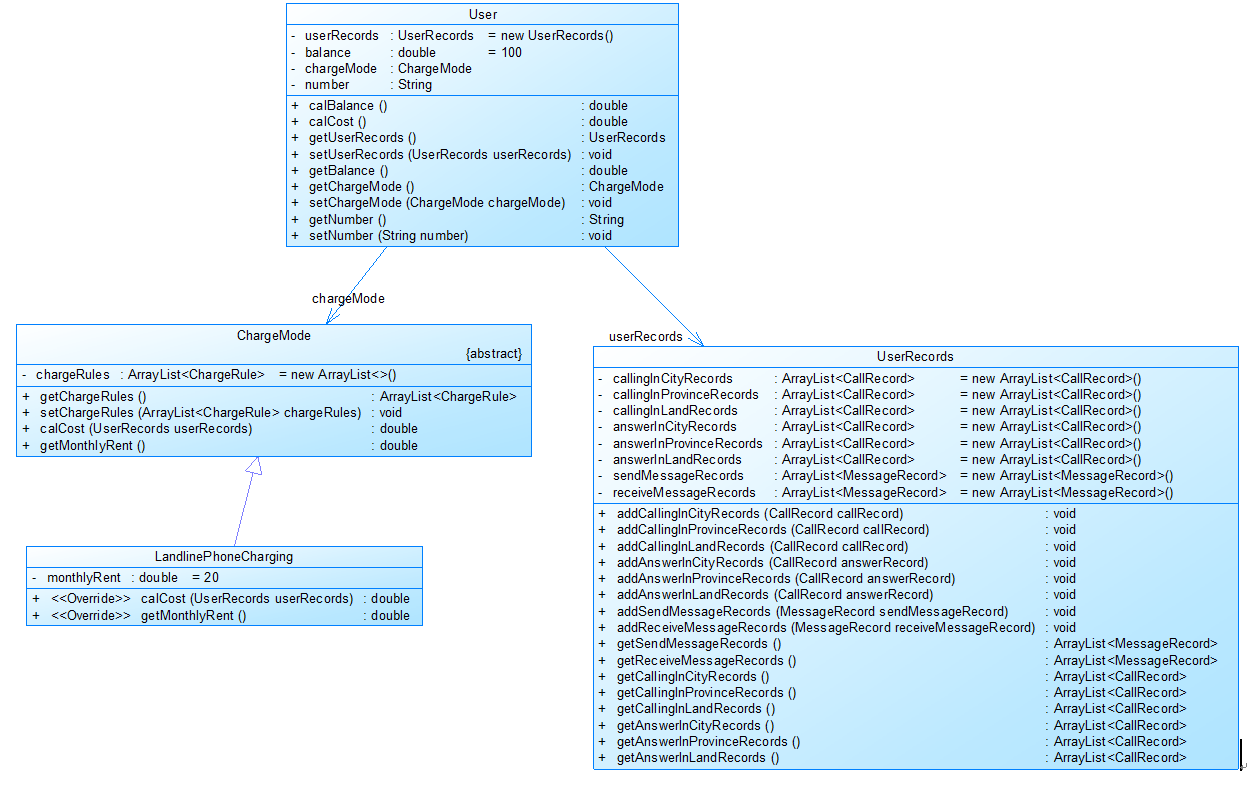
图1
图1中User是用户类,包括属性:
userRecords (用户记录)、balance(余额)、chargeMode(计费方式)、number(号码)。
ChargeMode是计费方式的抽象类:
chargeRules是计费方式所包含的各种计费规则的集合,ChargeRule类的定义见图3。
getMonthlyRent()方法用于返回月租(monthlyRent)。
UserRecords是用户记录类,保存用户各种通话、短信的记录,
各种计费规则将使用其中的部分或者全部记录。
其属性从上到下依次是:
市内拨打电话、省内(不含市内)拨打电话、省外拨打电话、
市内接听电话、省内(不含市内)接听电话、省外接听电话的记录
以及发送短信、接收短信的记录。
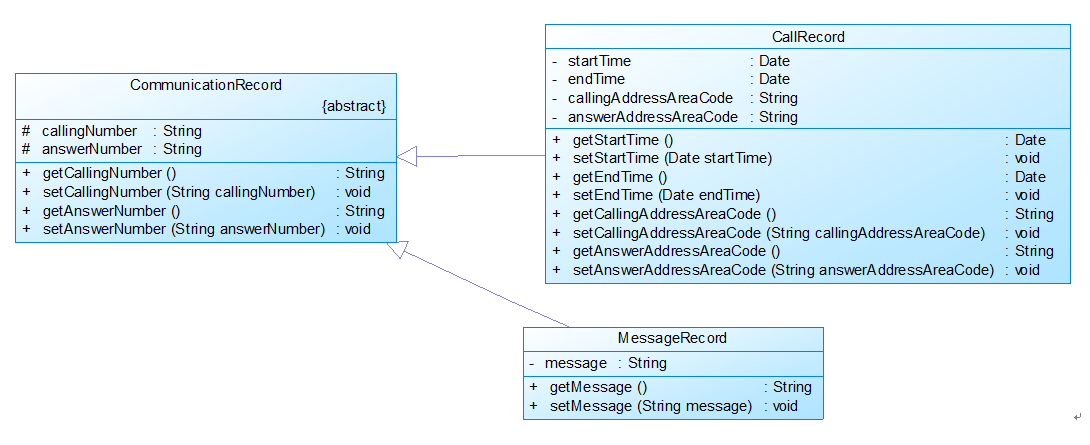
图2
图2中CommunicationRecord是抽象的通讯记录类:
包含callingNumber拨打号码、answerNumber接听号码两个属性。
CallRecord(通话记录)、MessageRecord(短信记录)是它的子类。
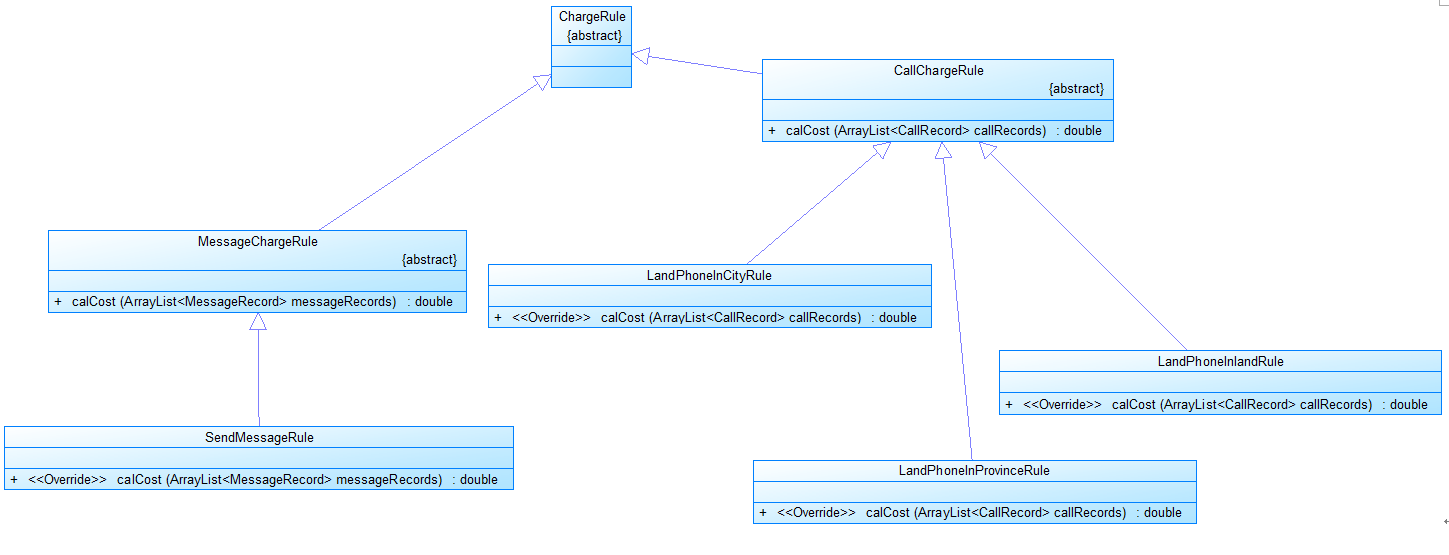
图3
图3是计费规则的相关类,这些类的核心方法是:
calCost(ArrayList callRecords)。
该方法针根据输入参数callRecords中的所有记录计算某用户的某一项费用;如市话费。
输入参数callRecords的约束条件:必须是某一个用户的符合计费规则要求的所有记录。
SendMessageRule是发送短信的计费规则类,用于计算发送短信的费用。
LandPhoneInCityRule、LandPhoneInProvinceRule、LandPhoneInLandRule三个类分别是座机拨打市内、省内、省外电话的计费规则类,用于实现这三种情况的费用计算。
(提示:可以从UserRecords类中获取各种类型的callRecords)。
注意:以上图中所定义的类不是限定要求,根据实际需要自行补充或修改。
输入样例:
在这里给出一组输入。例如:
u-18907910010 3
m-18907910010 13305862264 aaaaaaaaaaaaaaaaaaaaaaa
end
输出样例:
在这里给出相应的输出。例如:
18907910010 0.3 99.7
### 输入样例1:
在这里给出一组输入。例如:
u-18907910010 3
m-18907910010 13305862264 aaaaaaaaaaaa
m-18907910010 13305862264 aaaaaaa.
m-18907910010 13305862264 bb,bbbb
end
输出样例1:
在这里给出相应的输出。例如:
18907910010 0.5 99.5源代码:

import java.text.DecimalFormat;
import java.text.ParseException;
import java.text.SimpleDateFormat;
import java.util.Date;
import java.util.Map;
import java.util.Scanner;
import java.util.TreeMap;
import java.util.ArrayList;
import java.util.Date;
public class Main {
public static void main(String[] args) throws ParseException {
// TODO Auto-generated method stub
Scanner in = new Scanner(System.in);
String s = in.nextLine();
String numberjudge = "[u][-]1[3-9]\\d{9}[ ][3]";
String messagejudge = "m-1[3-9]\\d{9} 1[3-9]\\d{9} [a-z|0-9| |,|.]++";
TreeMap<String,User> set = new TreeMap<>();
String number;
User user;
int k = 0;
while(!s.equals("end")) {
if(k==0) {
while(!s.equals("end")&&s.charAt(0)=='u') {
if(s.matches(numberjudge)) {
String ss[] = s.split(" ");
user = new User();
number = ss[0].substring(ss[0].indexOf("-")+1);
user.setNumber(number);
set.put(number,user);
}
s = in.nextLine();
if(s.charAt(0)=='m') {
k = 1;
}
}
}
while(!s.equals("end")&&s.charAt(0)=='m') {
if(s.matches(messagejudge)) {
//m-18907910010 13305862264 bb,bbbb
MessageRecord record = new MessageRecord();
String s1 = s.substring(0,s.indexOf(" "));
String ss1 = s1.substring(s1.indexOf("-")+1);//发短信的电话号码
String s2 = s.substring(s.indexOf(" ")+1);
String ss2 = s2.substring(0,s2.indexOf(" ")-1);//收短信的号码
String message = s2.substring(s2.indexOf(" ")+1);
for (Map.Entry<String, User> e : set.entrySet()) {
if(e.getKey().equals(ss1)) {
record.setCallingNumber(ss1);
record.setAnswerNumber(ss2);
record.setMessage(message);
e.getValue().getUserRecords().addSendMessageRecords(record);
}
}
}
s = in.nextLine();
}
if(!s.equals("end")) {
s = in.nextLine();
}
}
DecimalFormat d = new DecimalFormat("###0.0#");
for (Map.Entry<String, User> e : set.entrySet()) {
System.out.println(e.getValue().getNumber()+" "+d.format(e.getValue().callCost())+" "+d.format(e.getValue().callBalance()));
}
}
}
abstract class AnswerChargeRule {
public abstract double AnswerCost (ArrayList<CallRecord> callRecords);
}
class AnswerInLandRule extends AnswerChargeRule{
@Override
public double AnswerCost(ArrayList<CallRecord> answerRecords) {
// TODO Auto-generated method stub
double cost = 0;
double m;
for(CallRecord a : answerRecords) {
m = Double.valueOf(a.getEndTime().getTime() - a.getStartTime().getTime())/1000/60;
int n = (int)m;
if(m-n>0.000001) {
n = n+1;
}
cost += 0.3 * n;
}
return cost;
}
}
abstract class CallChargeRule{
private double price;
public abstract double callCost (ArrayList<CallRecord> callRecords);
public double getPrice() {
return price;
}
public void setPrice(double price) {
this.price = price;
}
}
class CallRecord {
private String callingAdressAreaCode;
private String AnswerAdressAreaCode;
private Date startTime;
private Date endTime;
public String getCallingAdressAreaCode() {
return callingAdressAreaCode;
}
public void setCallingAdressAreaCode(String callingAdressAreaCode) {
this.callingAdressAreaCode = callingAdressAreaCode;
}
public String getAnswerAdressAreaCode() {
return AnswerAdressAreaCode;
}
public void setAnswerAdressAreaCode(String answerAdressAreaCode) {
AnswerAdressAreaCode = answerAdressAreaCode;
}
public Date getStartTime() {
return startTime;
}
public void setStartTime(Date startTime) {
this.startTime = startTime;
}
public Date getEndTime() {
return endTime;
}
public void setEndTime(Date endTime) {
this.endTime = endTime;
}
}
abstract class ChargeMode {
private ArrayList<CallChargeRule> chargeRules = new ArrayList<>();
private ArrayList<AnswerChargeRule> answerule = new ArrayList<>();
public ArrayList<CallChargeRule> getChargeRules() {
return chargeRules;
}
public void setChargeRules(ArrayList<CallChargeRule> chargeRules) {
this.chargeRules = chargeRules;
}
public abstract double callCost(UserRecords userRecords);
public abstract double getMonthlyRent ();
public abstract void setMonthlyRent(double a);
public ArrayList<AnswerChargeRule> getAnswerule() {
return answerule;
}
public void setAnswerule(ArrayList<AnswerChargeRule> answerule) {
this.answerule = answerule;
}
}
class CommunicateRecord {
protected String callingNumber;
protected String answerNumber;
public String getCallingNumber() {
return callingNumber;
}
public void setCallingNumber(String callingNumber) {
this.callingNumber = callingNumber;
}
public String getAnswerNumber() {
return answerNumber;
}
public void setAnswerNumber(String answerNumber) {
this.answerNumber = answerNumber;
}
}
class LandlinePhoneCharging extends ChargeMode{
private double monthlyRent = 20;
@Override
public double callCost(UserRecords userRecords) {
// TODO Auto-generated method stub
CallChargeRule a = new LandPhoneInCityRule();
CallChargeRule b = new LandPhoneInProvinceRule();
CallChargeRule c = new LandPhoneInlandRule();
double callcost = a.callCost(userRecords.getCallingInCityRecords()) + b.callCost(userRecords.getCallingInProvinceRecords()) + c.callCost(userRecords.getCallingInLandRecords());
return callcost;
}
@Override
public double getMonthlyRent() {
// TODO Auto-generated method stub
return monthlyRent;
}
public void setMonthlyRent(double monthlyRent) {
this.monthlyRent = monthlyRent;
}
}
class LandPhoneInCityRule extends CallChargeRule{
@Override
public double callCost(ArrayList<CallRecord> callRecords) {
// TODO Auto-generated method stub
double cost = 0;
double m;
for(CallRecord a : callRecords) {
m = Double.valueOf(a.getEndTime().getTime() - a.getStartTime().getTime())/1000/60;
int n = (int)m;
if(m-n>0.000001) {
n = n+1;
}
cost += 0.1 * n;
}
return cost;
}
}
class LandPhoneInlandRule extends CallChargeRule{
@Override
public double callCost(ArrayList<CallRecord> callRecords) {
// TODO Auto-generated method stub
double cost = 0;
double m;
for(CallRecord a : callRecords) {
m = Double.valueOf(a.getEndTime().getTime() - a.getStartTime().getTime())/1000/60;
int n = (int)m;
if(m-n>0.000001) {
n = n+1;
}
cost += 0.6 * n;
}
return cost;
}
}
class LandPhoneInProvinceRule extends CallChargeRule{
@Override
public double callCost(ArrayList<CallRecord> callRecords) {
// TODO Auto-generated method stub
double cost = 0;
double m;
for(CallRecord a : callRecords) {
m = Double.valueOf(a.getEndTime().getTime() - a.getStartTime().getTime())/1000/60;
int n = (int)m;
if(m-n>0.000001) {
n = n+1;
}
cost += 0.3 * n;
}
return cost;
}
}
class MessageChargeRule {
public double MessageCost(ArrayList<MessageRecord> messageRecords) {
// TODO Auto-generated method stub
double cost = 0;
int i = 0;
int j = 0;
int n = messageRecords.size();
for(MessageRecord a : messageRecords) {
j = 0;
String m = a.getMessage();
int k = m.length();
if(k>10) {
if(k%10>0) {
j = k/10 + 1;
}
else {
j = k/10;
}
}
else {
j = 1;
}
for(int x=1;x<=j;x++) {
if(i+x<=3) {
cost += 0.1;
}
else if(i+x>3&&i+x<=5) {
cost += 0.2;
}
else {
cost += 0.3;
}
}
i +=j;
}
return cost;
}
}
class MessageRecord extends CommunicateRecord{
private String message;
public String getMessage() {
return message;
}
public void setMessage(String message) {
this.message = message;
}
}
class PhoneCharging extends ChargeMode{
private double monthlyRent = 15;
@Override
public double callCost(UserRecords userRecords) {
// TODO Auto-generated method stub
double cost = 0;
CallChargeRule a = new PhoneInCittCallInLand();
CallChargeRule b = new PhoneInCityCallInCity();
CallChargeRule c = new PhoneInCityCallInProvince();
CallChargeRule d = new PhoneInLandCallOther();
CallChargeRule e = new PhoneInProvinceCallOther();
AnswerChargeRule f = new AnswerInLandRule();
cost += f.AnswerCost(userRecords.getAnswerInLandRecords()) + a.callCost(userRecords.getPhonecallingInCityInLandRecords());
cost += b.callCost(userRecords.getPhonecallingInCityInCityRecords()) + c.callCost(userRecords.getPhonecallingInCityInProvinceRecords());
cost += d.callCost(userRecords.getPhonecallingInLandOtherRecords()) + e.callCost(userRecords.getPhonecallingInProvinceRecords());
return cost;
}
@Override
public double getMonthlyRent() {
// TODO Auto-generated method stub
return monthlyRent;
}
@Override
public void setMonthlyRent(double monthlyRent) {
// TODO Auto-generated method stub
this.monthlyRent = monthlyRent;
}
}
class PhoneInCittCallInLand extends CallChargeRule{
@Override
public double callCost(ArrayList<CallRecord> callRecords) {
// TODO Auto-generated method stub
double cost = 0;
double m;
for(CallRecord a : callRecords) {
m = Double.valueOf(a.getEndTime().getTime() - a.getStartTime().getTime())/1000/60;
int n = (int)m;
if(m-n>0.000001) {
n = n+1;
}
cost += 0.3 * n;
}
return cost;
}
}
class PhoneInCityCallInCity extends CallChargeRule{
@Override
public double callCost(ArrayList<CallRecord> callRecords) {
// TODO Auto-generated method stub
double cost = 0;
double m;
for(CallRecord a : callRecords) {
m = Double.valueOf(a.getEndTime().getTime() - a.getStartTime().getTime())/1000/60;
int n = (int)m;
if(m-n>0.000001) {
n = n+1;
}
cost += 0.1 * n;
}
return cost;
}
}class PhoneInCityCallInProvince extends CallChargeRule{
@Override
public double callCost(ArrayList<CallRecord> callRecords) {
// TODO Auto-generated method stub
double cost = 0;
double m;
for(CallRecord a : callRecords) {
m = Double.valueOf(a.getEndTime().getTime() - a.getStartTime().getTime())/1000/60;
int n = (int)m;
if(m-n>0.000001) {
n = n+1;
}
cost += 0.2 * n;
}
return cost;
}
}class PhoneInLandCallOther extends CallChargeRule{
@Override
public double callCost(ArrayList<CallRecord> callRecords) {
// TODO Auto-generated method stub
double cost = 0;
double m;
for(CallRecord a : callRecords) {
m = Double.valueOf(a.getEndTime().getTime() - a.getStartTime().getTime())/1000/60;
int n = (int)m;
if(m-n>0.000001) {
n = n+1;
}
cost += 0.6 * n;
}
return cost;
}
}
class PhoneInProvinceCallOther extends CallChargeRule{
@Override
public double callCost(ArrayList<CallRecord> callRecords) {
// TODO Auto-generated method stub
double cost = 0;
double m;
for(CallRecord a : callRecords) {
m = Double.valueOf(a.getEndTime().getTime() - a.getStartTime().getTime())/1000/60;
int n = (int)m;
if(m-n>0.000001) {
n = n+1;
}
cost += 0.3 * n;
}
return cost;
}
}
class User {
private UserRecords userRecords = new UserRecords();
private double balance = 100;
private ChargeMode chargemode1 = new LandlinePhoneCharging();
private ChargeMode chargemode2 = new PhoneCharging();
private MessageChargeRule message = new MessageChargeRule();
private String number;
public double callBalance() {
if(number.charAt(0)=='1') {
balance = balance - message.MessageCost(userRecords.getSendMessageRecords());
}
else {
balance = balance - (this.callCost() + chargemode1.getMonthlyRent());
}
return balance;
}
public double callCost() {
if(number.charAt(0)=='1') {
return message.MessageCost(userRecords.getSendMessageRecords());
}
else {
return chargemode1.callCost(userRecords);
}
}
public UserRecords getUserRecords() {
return userRecords;
}
public void setUserRecords(UserRecords userRecords) {
this.userRecords = userRecords;
}
public double getBalance() {
return balance;
}
public ChargeMode getChargemode() {
if(number.charAt(0)=='1') {
return chargemode2;
}
else {
return chargemode1;
}
}
public void setChargemode(ChargeMode chargemode) {
if(number.charAt(0)=='1') {
this.chargemode2 = chargemode;
}
else {
this.chargemode1 = chargemode;
}
}
public String getNumber() {
return number;
}
public void setNumber(String number) {
this.number = number;
}
}
class UserRecords {
private ArrayList<CallRecord> callingInCityRecords = new ArrayList<CallRecord>();
private ArrayList<CallRecord> callingInProvinceRecords = new ArrayList<CallRecord>();
private ArrayList<CallRecord> callingInLandRecords = new ArrayList<CallRecord>();
private ArrayList<CallRecord> PhonecallingInLandOtherRecords = new ArrayList<CallRecord>();
private ArrayList<CallRecord> PhonecallingInCityInLandRecords = new ArrayList<CallRecord>();
private ArrayList<CallRecord> PhonecallingInProvinceRecords = new ArrayList<CallRecord>();
private ArrayList<CallRecord> PhonecallingInCityInProvinceRecords = new ArrayList<CallRecord>();
private ArrayList<CallRecord> PhonecallingInCityInCityRecords = new ArrayList<CallRecord>();
private ArrayList<CallRecord> answerInCityRecords = new ArrayList<CallRecord>();
private ArrayList<CallRecord> answerInProvinceRecords = new ArrayList<CallRecord>();
private ArrayList<CallRecord> answerInLandRecords = new ArrayList<CallRecord>();
private ArrayList<MessageRecord> sendMessageRecords = new ArrayList<MessageRecord>();
private ArrayList<MessageRecord> receiveMessageRecords = new ArrayList<MessageRecord>();
public void addCallingInCityRecords (CallRecord callRecord) {
callingInCityRecords.add(callRecord);
}
public void addCallingInProvinceRecords (CallRecord callRecord) {
callingInProvinceRecords.add(callRecord);
}
public void addCallingInLandRecords (CallRecord callRecord) {
callingInLandRecords.add(callRecord);
}
public void addAnswerInCityRecords (CallRecord answerRecord) {
answerInCityRecords.add(answerRecord);
}
public void addAnswerInProvinceRecords (CallRecord answerRecord) {
answerInProvinceRecords.add(answerRecord);
}
public void addAnswerInLandRecords (CallRecord answerRecord) {
answerInLandRecords.add(answerRecord);
}
public void addSendMessageRecords (MessageRecord sendMessageRecord) {
sendMessageRecords.add(sendMessageRecord);
}
public void addReceiveMessageRecords (MessageRecord receiveMessageRecord) {
receiveMessageRecords.add(receiveMessageRecord);
}
public ArrayList<CallRecord> getCallingInCityRecords() {
return callingInCityRecords;
}
public ArrayList<CallRecord> getCallingInProvinceRecords() {
return callingInProvinceRecords;
}
public ArrayList<CallRecord> getCallingInLandRecords() {
return callingInLandRecords;
}
public ArrayList<CallRecord> getAnswerInCityRecords() {
return answerInCityRecords;
}
public ArrayList<CallRecord> getAnswerInProvinceRecords() {
return answerInProvinceRecords;
}
public ArrayList<CallRecord> getAnswerInLandRecords() {
return answerInLandRecords;
}
public ArrayList<MessageRecord> getReceiveMessageRecords() {
return receiveMessageRecords;
}
public ArrayList<MessageRecord> getSendMessageRecords() {
return sendMessageRecords;
}
public ArrayList<CallRecord> getPhonecallingInLandOtherRecords() {
return PhonecallingInLandOtherRecords;
}
public void addPhonecallingInLandOtherRecords(CallRecord phonecallingInLandOtherRecords) {
PhonecallingInLandOtherRecords.add(phonecallingInLandOtherRecords);
}
public ArrayList<CallRecord> getPhonecallingInCityInLandRecords() {
return PhonecallingInCityInLandRecords;
}
public void addPhonecallingInCityInLandRecords(CallRecord phonecallingInCityInLandRecords) {
PhonecallingInCityInLandRecords.add(phonecallingInCityInLandRecords);
}
public ArrayList<CallRecord> getPhonecallingInCityInProvinceRecords() {
return PhonecallingInCityInProvinceRecords;
}
public void addPhonecallingInCityInProvinceRecords(CallRecord phonecallingInCityInProvinceRecords) {
PhonecallingInCityInProvinceRecords.add(phonecallingInCityInProvinceRecords);
}
public ArrayList<CallRecord> getPhonecallingInCityInCityRecords() {
return PhonecallingInCityInCityRecords;
}
public void addPhonecallingInCityInCityRecords(CallRecord phonecallingInCityInCityRecords) {
PhonecallingInCityInCityRecords.add(phonecallingInCityInCityRecords);
}
public ArrayList<CallRecord> getPhonecallingInProvinceRecords() {
return PhonecallingInProvinceRecords;
}
public void addPhonecallingInProvinceRecords(CallRecord phonecallingInProvinceRecords) {
PhonecallingInProvinceRecords.add(phonecallingInProvinceRecords);
}
}
View Code
SourceMonitor报表如下:

三、采坑心得:
1.正则表达式输入错误。
2.数据进行处理时,当代码的复杂度过高时,每次新增功能时都要花很长的时间进行修改读取和判断格式错误上。
3.因为有许多无用代码,导致找到自己所需要的东西需要花费很多时间,所以我新建了一个项目,将所需要的类保留下来,这样节省了时间,在简化后的项目了增加这题所需要实现的功能。
四、改进建议:
1.多分几个函数,以此提高代码复用率,减少代码的复杂性。
2.尝试使用父类,抽象类,对代码进行忧化。
3.重写抽象方法:抽象类本身是抽象的、模糊的、不具体的类。父类中的功能是不能删除的,但其形式是不需要的(没有存在的意义),此时就可以将父类中功能的 具体实现 形式 给删掉,而我们需要在实际运用下根据自己的需求重写抽象方法来提高效率,获得有用数据。
五、总结:
1.类和类之间具有共同特征,将这些共同特征提取出来,形成的就是抽象类。抽象类无法创建对象即无法实例化。
2.抽象类是无法实例化的,无法创建对象的,所以抽象类是用来被子类继承的。
3.这几次的作业让我感受到了编写代码需要严谨,要考虑每种不同的情况,这样才能保证程序没有漏洞,在不严谨的思绪下写出来的代码,可能你用数据测试最后得到的结果却是正确的,最后找不到漏洞在哪,需要花更大量的时间去找到漏洞并且修复。
标签:return,String,double,ArrayList,BLOG,new,public From: https://www.cnblogs.com/20011211zqp/p/16971507.html